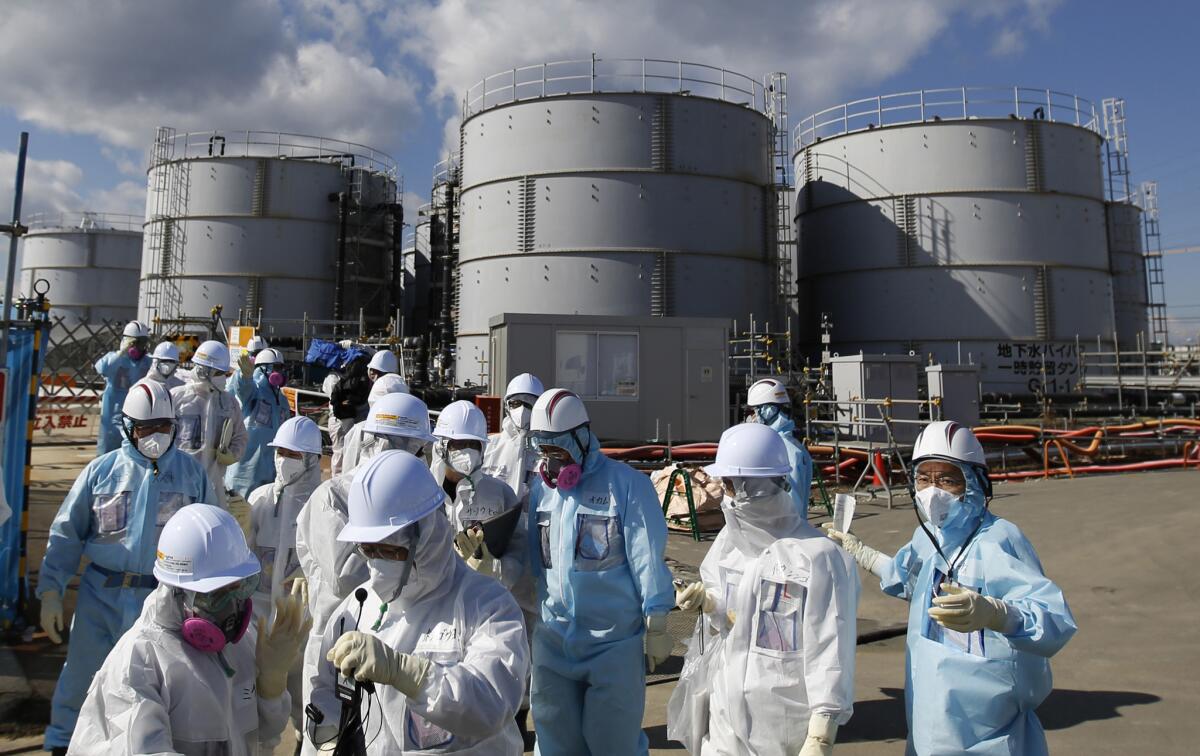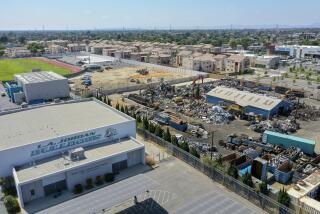Trial in Japan will delve into ‘the hidden truths’ of the Fukushima nuclear meltdown

A media tour group in protective suits stands near the tsunami-crippled Fukushima Daiichi nuclear power plant in Okuma, Japan, on Feb. 10, 2016.
- Share via
Reporting from Tokyo — Three former executives of the Tokyo Electric Power Co. were indicted Monday on charges of failing to take measures to prevent the disaster at the Fukushima Daiichi nuclear power plant in March 2011, the Tokyo prosecutor’s office announced.
The accident resulted in a triple meltdown that displaced more than 100,000 people and raised alarms about nuclear energy around the world. The indictment says it also caused deaths and injuries.
The trial will center on whether key Tokyo Electric Power Co. executives can be held criminally responsible for what the Japanese parliament’s Fukushima Nuclear Accident Independent Investigation Commission called “a man-made disaster.”
NEWSLETTER: Get the day’s top headlines from Times Editor Davan Maharaj >>
Tsunehisa Katsumata, 75, chairman of Tokyo Electric Power Co., or Tepco, at the time of the accident, and two former vice presidents — Sakae Muto, 65, and Ichiro Takekuro, 69 — were indicted on charges of professional negligence resulting in death and injury. A court-approved lawyer will act as the prosecutor in the trial.
The prosecutors office’s announcement noted that the six-reactor plant, located on the Pacific coast, was disabled after tidal waves triggered by the massive earthquake on March 11, 2011, flooded power supply facilities, which were unprotected, and crippled reactor cooling systems.
The Nos. 1 to 3 reactors suffered fuel meltdowns, while hydrogen explosions damaged others.
The indictment blames the three former executives for injuries to more than 10 people from hydrogen explosions at the plant, as well as the deaths of 44 patients forced to evacuate from a nearby hospital.
The indictment does not hold Tepco executives responsible for the deaths of two workers who had rushed to the turbine room of the No. 4 reactor after the earthquake. Autopsies suggested they were killed by the impact of the tsunami.
All of the former executives will probably plead not guilty, Japanese media reported.
None were taken into custody after they were charged, although in Japan, suspects in criminal cases are typically arrested and held for up to 23 days. Last year, former Toyota Motor Corp. executive Julie Hamp was kept in custody for 20 days after she was arrested in Tokyo on suspicion of importing tablets of the painkiller oxycodone without permission. Prosecutors later dropped the case.
The Tepco prosecution has been a long time coming. Last July, the Tokyo Prosecutorial Review Board No. 5 decided to mandate that the three be charged with professional negligence for their handling of the disaster, overturning a 2013 decision by prosecutors not to indict them.
“This trial will take quite a long time but I feel that ultimately they will be found guilty,” lawyer Hiroyuki Kawai, who was instrumental in seeing that Tepco officials faced prosecution, said in an email. “The hidden truths of what really caused the Fukushima nuclear accident keep coming to light, one after another.”
Nuclear power plant operators in Japan have faced similar charges in the past and been found guilty. In April 2003, the Mito District Court found the company JCO and six of its employees guilty over a fatal nuclear accident. They ruled that the company had allowed workers to use buckets to pour uranium solution into a processing tank, causing a nuclear fission chain reaction that resulted in the deaths of workers. Those found guilty were given suspended sentences and served no time in jail.
Kawai said the Fukushima disaster was a clear demonstration that Japan, which is located in the so-called Ring of Fire, with frequent seismic activity, was unsafe for nuclear power.
Tepco has not returned calls asking for comment. According to Kyodo News service, the power company’s public relations office offered a renewed apology over the accident but wouldn’t comment on the indictment because it concerns a criminal case.
Last year, amid public protest, Japan restarted its long dormant nuclear reactors.
The Kansai Electric Power Co. announced Monday that a reactor at its recently restarted Takahama plant in Fukui prefecture had been shut down after a problem with a generator triggered an alarm. On Feb. 20, there was also a coolant water leak at a building attached to the reactor.
Adelstein is a special correspondent. Special correspondent Mari Yamamoto contributed to this report.
ALSO
Pentagon wages cyberwar against Islamic State
Methane explosions in Russian coal mine kill 36; cause disputed
Student activists in Hong Kong expect justice as they face charges over protests
More to Read
Sign up for Essential California
The most important California stories and recommendations in your inbox every morning.
You may occasionally receive promotional content from the Los Angeles Times.










